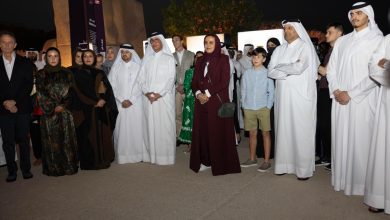QNL’s Cultural Salon Explores Wide-Ranging Impact of Artificial Intelligence for Arab Societies
صالون مكتبة قطر الوطنية الثقافي يناقش الذكاء الاصطناعي من منظور العلم وتحديات العمل والأخلاق
QNA
Doha: Qatar National Library, in partnership with Hamad Bin Khalifa University (HBKU), held its second Cultural Salon on Monday, bringing together prominent academics in the fields of computing and ethics to explore the topic, “Artificial Intelligence: Science, Work, and Ethical Challenges”.
The Cultural Salon began with an insightful discussion that delved into the challenges, opportunities, and ethical considerations that arise as AI reshapes our world within the realms of work, society, and culture. The event was attended by guests from the media and the wider community.
Chaired by Dr. Ahmed K. Almagarmid, Executive Director of the Qatar Computing Research Institute (QCRI) at HBKU, the panel featured Dr. Ghanim Al-Sulaiti, a scientist at QCRI and an AI technology expert, and Dr. Mohammed Ghaly, Professor of Islamic Studies and Bioethics at the College of Islamic Studies, HBKU.
Commenting on the event, HE Minister of State and President of Qatar National Library, Dr. Hamad bin Abdulaziz Al Kawari, said: “The Cultural Salon at Qatar National Library has made significant strides in its second session, solidifying its position as a prominent platform for intellectual and scholarly dialogue within Qatar’s cultural landscape. This success reaffirms the Qatar National Library’s role as an influential cultural institution, driving insightful discussions on key trends, developments, and issues spanning various fields of knowledge, both locally and on a regional and global scale.” “Today’s session focused on the compelling subject of artificial intelligence technology, which has garnered widespread attention across media outlets, technology platforms, internet companies, and search engines.
Recognizing the significance of this technology, our aim was to explore its vast and wide-ranging prospects. This endeavor aligns with the Library’s commitment to educate and raise awareness among society about future advancements that profoundly impact individuals in their professional, academic, and daily lives.” Concluding his remarks, Dr. Al Kawari said, “We take great pride in our continued partnership and collaboration with Hamad Bin Khalifa University in organizing these engaging Cultural Salon sessions.
This event serves as a vibrant and dynamic channel of communication, facilitating meaningful exchanges among experts, specialists, and the wider public. Not only does it offer a platform for individuals to listen to experts, but it also encourages active participation, fostering discussions, and providing an opportunity for participants to share their ideas, perspectives, and opinions on the topics addressed during the Cultural Salon sessions.” Opening the session with an exciting overview of AIs evolution in all its complexity, while highlighting its significance and potential impacts, Dr. Almagarmid noted: “At its core, artificial intelligence aims to design and actualize systems that are capable of learning and decision-making autonomously. Subtly yet profoundly, AI has woven itself into our everyday activities, most notably seen in virtual assistants such as Amazon’s Alexa and Google Assistant. It is leading revolutions across a vast spectrum of fields, effecting transformations that would have been unimaginable a few years ago. Furthermore, AI has become a catalyst in accelerating many routine tasks, enabling humans to shift their focus towards monitoring quality, improving resource scheduling and production, analyzing errors, and continually fine-tuning operations. This notable shift allows for a broadening of the creative horizon, superseding the realm of repetition.”
Sharing his expertise, Dr. Al Sulaiti focused on the impact of AI on various professions, including medicine, law, education, engineering, design, and accounting. He said: “Artificial intelligence, from my perspective, serves as a powerful tool to augment human abilities, not to replace them. For instance, doctors might employ AI programs to better detect health issues in patients, or teachers might use AI to tailor the learning experience to each student’s unique needs. This shows that AI doesn’t replace employees but enhances their capability to perform their roles more effectively. Current studies and reports reveal that cognitive, repetitive white-collar jobs are more influenced by AI than manual blue-collar roles. As this technology evolves, we see new job roles rising, like AI ethicists, AI system trainers, and AI maintenance specialists – positions that were unheard of just a decade ago. This stands as a testament to AI’s potential to spawn entirely new industries and professions.” For his part, Dr. Ghaly presented a comprehensive exploration of the ethical dimensions of AI. He said: “Ethical discourse on AI is still in its infancy, with most responses to date being brief and specific to certain concerns or questions. However, as we look at the current landscape and anticipate future developments, it’s apparent that AI technologies are adding complexity to these ethical matters. The universally accepted ethical principles such as justice, transparency, and respect for privacy are often broadly and ambiguously defined, leading to little room for disagreement, even among tech giants. A concerning scenario emerges when ‘knowledge production’ transforms into a commercial market dominated by these technology behemoths, which can accumulate significant intellectual property and decide who can access or benefit from the monopolized knowledge. This development poses substantial challenges not just to principles, but to their application in a way that resonates with diverse cultures and religious beliefs. However, there’s hope that public awareness of these risks will grow, potentially putting pressure on these companies to alter their behavior concerning these ethical aspects.” The expert talks led into a wider exchange with attendees in the audience. The interactions further enriched the dialogue with a diverse range of views and concerns around the impact of AI on privacy, freedom, and ethics.
The Cultural Salon was launched with the aim of creating an open public space that promotes dialogue, enriches culture and raises public awareness. In its second edition, the event succeeded in fostering a dynamic, multifaceted exchange of ideas with the potential to help shape understanding of the potential implications of AI applications on Arab and Muslim societies.
قنا
الدوحة: ناقشت الجلسة الثانية من سلسلة فعاليات الصالون الثقافي بمكتبة قطر الوطنية، موضوع /الذكاء الاصطناعي من منظور العلم وتحدّيات العمل والأخلاق/، بمشاركة خبراء وأكاديميين متخصصين في علوم الحوسبة والأخلاقيات.
ويأتي تنظيم هذه الفعالية التي حضرها جمهور غفير من المهتمين والمثقفين والإعلاميين، بالشراكة بين مكتبة قطر الوطنية وجامعة حمد بن خليفة.
تحدث في جلسة الصالون الثقافي التي أدارها الدكتور أحمد المقرمد، مدير معهد قطر لبحوث الحوسبة بجامعة حمد بن خليفة، كل من الدكتور غانم السليطي، خبير تكنولوجيا الذكاء الاصطناعي بمعهد قطر لبحوث الحوسبة بجامعة حمد بن خليفة، والدكتور محمد غالي، أستاذ الدراسات الإسلامية وأخلاقيات الطب الحيوي، كلية الدراسات الإسلامية بجامعة حمد بن خليفة.
وأكد سعادة الدكتور حمد بن عبدالعزيز الكوّاري، وزير الدولة ورئيس مكتبة قطر الوطنية، في تصريح لوكالة الأنباء القطرية /قنا/، أن الصالون الثقافي لمكتبة قطر الوطنية بدأ يشق طريقه بنجاح وبدأ يؤكد دوره كمنبر حواري وفكري ملهم في المشهد الثقافي القطري، ورسخ مكانة مكتبة قطر الوطنية كمؤسسة ثقافية مبادرة وفاعلة وسباقة إلى مناقشة أبرز التوجهات والتطورات والقضايا في مختلف مناحي المعرفة على الأصعدة المحلية والإقليمية والعالمية”. ونوه بأن تكنولوجيا الذكاء الاصطناعي صارت اليوم، الشغل الشاغل والحديث الدائم لمختلف وسائل الإعلام ومنابر التكنولوجيا وشركات الإنترنت ومحركات البحث، ولهذا، “إدراكًا منا لأهمية هذه التقنية واستشرافًا لآفاقها الرحبة والواسعة وانطلاقًا من دور المكتبة في تثقيف المجتمع وتوعيته بأهم التطورات المستقبلية التي تؤثر على مختلف أفراده سواء في العمل أو الدراسة أو الأنشطة الحياتية اليومية، يأتي اختيار هذا الموضوع الهام”.
وأعرب سعادته عن اعتزازه باستمرار الشراكة والتعاون مع جامعة حمد بن خليفة في تنظيم جلسات هذا الصالون الثقافي الذي بات قناة تواصل إيجابية وثرية بين الخبراء والمتخصصين والجمهور، وأتاح لأفراد المجتمع ليس فقط الاستماع إلى الخبراء، بل ومحاورتهم ومناقشة أفكارهم وعرض وجهات نظرهم وآرائهم حول القضية أو موضوع المناقشة في جلسات الصالون الثقافي.
من جهته، قدم الدكتور أحمد المقرمد إضاءة عامة حول تطوّر تكنولوجيا الذكاء الاصطناعي وتعقيداته وأهميته وتأثيراته المحتملة.. مشيرا إلى أن الذكاء الاصطناعي يهدف إلى تصميم وبناء أنظمة قادرة على تنفيذ مهام مختلفة بالاعتماد على قدرة الآلة على التعلّم الذاتي واتخاذ القرارات بشكل مستقل. وأوضح أننا نستخدم الذكاء الاصطناعي اليوم في العديد من أنشطتنا الحياتية اليومية، إذ أحدث الذكاء الاصطناعي ثورة في الكثير من المجالات ومنها السيارات ذاتية القيادة التي كانت ضربًا من الخيال قبل عدة سنوات، حيث أسهم الذكاء الاصطناعي في تسريع وتيرة إنجاز كثير من الأعمال الروتينية، وتمكين الإنسان من نقل تركيزه إلى مراقبة الجودة وتحسين تخصيص الموارد والإنتاجية، وتحليل الأخطاء والتحسين المستمر للعمليات وإتاحة مجال أكبر للإبداع بدلًا من تكرار العمليات الروتينية.
ولفت الدكتور المقرمد، إلى أن جامعة حمد بن خليفة ساهمت في تطوير الاستراتيجية الوطنية للذكاء الاصطناعي والتي تم الإعلان عنها عام 2019 والآن هي الاستراتيجية الرسمية، والتي طورت من قبل جامعة حمد بن خليفة و وزارة الاتصالات.
من جانبه، ركز الدكتور غانم السليطي خبير تكنولوجيا الذكاء الاصطناعي بمعهد قطر لبحوث الحوسبة بجامعة حمد بن خليفة، على تأثير الذكاء الاصطناعي على المهن المختلفة، ومنها الطب والقانون والتعليم والهندسة والتصميم والمحاسبة، قائلاً:” في اعتقادي الشخصي، الذكاء الاصطناعي أداة لتطوير وتعزيز القدرات والوظائف البشرية، فعلى سبيل المثال، قد يستخدم الطبيب برنامجًا للذكاء الاصطناعي للمساعدة في اكتشاف المشكلات الصحية لدى المرضى، وقد يستخدم المعلّم الذكاء الاصطناعي لمساعدة كل طالب على التعلّم بطريقته الخاصة. وفي هذه الحالات، لا يحل الذكاء الاصطناعي محل الموظفين، بل يصبح أداة مفيدة تساعدهم على أداء وظائفهم بشكل أفضل”.
وساق بين يدي الحضور بعضا مما جاء في تقرير منتدى الاقتصاد العالمي لسنة 2021، والذي توقع أن حوالي 85 شخصا سيفقدون وظائفهم بسبب الذكاء الاصطناعي بحلول عام 2025، وبالمقابل توقع أن يساهم بحلول هذا العام (2025) بخلق 97 مليون وظيفة.
وفنّد الدكتور السليطي بعض الآراء التي تنبأت باختفاء بعض المهن مع تطور الذكاء الاصطناعي، مبينا بلغة الأرقام أن الإقبال عليها زاد بوتيرة متسارعة.
وأضاف: “تشير الدراسات والتقارير الحديثة إلى أن الوظائف المكتبية للمهنيين المتخصصين سوف تتأثر بالذكاء الاصطناعي أكثر من وظائف العمّال. ومع تطوّر تكنولوجيا الذكاء الاصطناعي، ستظهر وظائف لم تكن موجودة من قبل مثل الحاجة إلى خبراء في صيانة أنظمة الذكاء الاصطناعي وتدريبها وأخلاقيات استخدامها، الأمر الذي سيؤدي إلى نشأة صناعات ومهن جديدة”.
في حين قدم الدكتور محمد غالي أستاذ الدراسات الإسلامية وأخلاقيات الطب الحيوي بكلية الدراسات الإسلامية بجامعة حمد بن خليفة، كلمة ضافية حول الجوانب الأخلاقية للذكاء الاصطناعي، قائلًا: “لا تزال النقاشات الشرعية والأخلاقية حول موضوع الذكاء الاصطناعي في بداياتها، ومعظم ما صدر إلى الآن مجرّد فتاوى موجزة ردًا على أسئلة واستفسارات حول قضايا جزئية.. في رأيي الشخصي، المبادئ الحاكمة المتداولة حاليًا (مثل العدالة والشفافية واحترام الخصوصية..) قد تمّت صياغتها بشكل عام وفضفاض للغاية حتى لا يكاد يختلف معها أحد تقريبًا، بما في ذلك شركات التكنولوجيا العملاقة”.
وأضاف: “بالنظر إلى الوضع الحالي وتوقّع التطوّرات القادمة، يبدو أن تقنيات الذكاء الاصطناعي ستضفي المزيد من التعقيد على المسائل الأخلاقية”، منبها إلى أن السيناريو الأسوأ هو أن يتحوّل “إنتاج المعرفة” إلى سوق تجاري تتحكم فيه الشركات الضخمة للتكنولوجيا، لأنها ستتمكّن من الحصول على أكبر قدر ممكن من الملكيات الفكرية. وأن هذا التطوّر سيشكّل تحديات جسيمة ليس فقط على مستوى المبادئ الأخلاقية الكبرى، بل أيضًا أمام تطبيقها على أرض الواقع بما يتفق مع ثقافات الشعوب ومعتقداتها الدينية. معربا عن أمله في أن يكتسب عموم الناس الوعي بمثل هذه المخاطر وأن ينتج عن ذلك ضغط على هذه الشركات لتغيير سلوكها إزاء هذه الجوانب الأخلاقية”.
كما نبّه إلى ما يكتنف بعض تطبيقات الذكاء الاصطناعي من مثالب، خصوصا أثناء تقديم المعلومة للمتلقي، حيث إن هذا “الذكاء” ينهل من جميع ما يوجد على الشبكة العنكبوتية، بين من أغنى المحتوى الرقمي وله باع في البحث الرصين، وبين من كتب تدوينة أو تغريدة على حسابه على وسائل التواصل الاجتماعي ولا يفقه شيئا فيما يقول، حيث يتساوى العالم والجاهل.
وتفاعل الحضور مع ما جاء به المشاركون، وأغنوا جلسة الصالون الثقافي بنقاشاتهم والتفاعل الإيجابي مع مضامينها.
جدير بالذكر أن الصالون الثقافي هو مبادرة مكتبة قطر الوطنية لتحقيق رسالتها الساعية لتمكين المواطنين والمقيمين من التأثير الإيجابي في مجتمعهم عبر توفير بيئة استثنائية للتعلّم والاستكشاف.
ويهدف الصالون إلى إتاحة منبر فكري وحوار مفتوح بين نخبة المتخصصين والجمهور العام بما يثري المشهد الثقافي ويعزز الوعي المجتمعي بأهم القضايا والتوجّهات المعاصرة.




